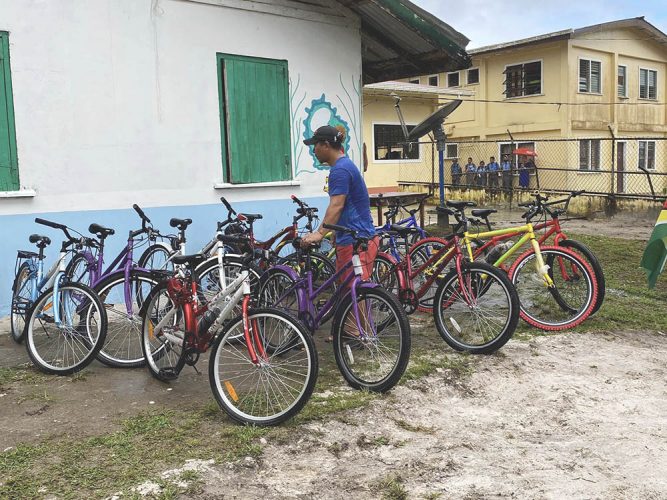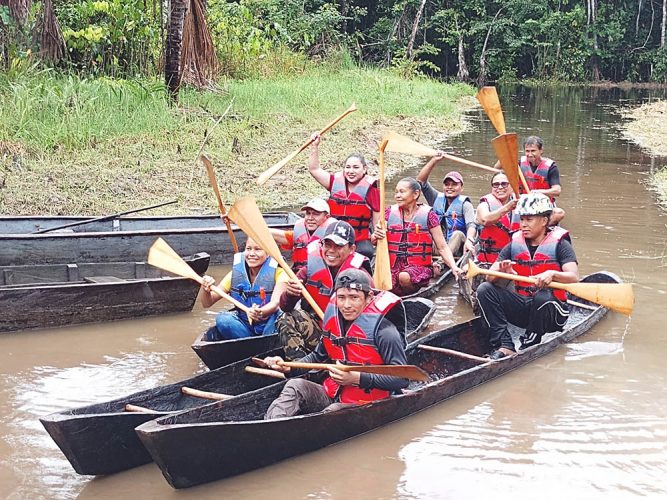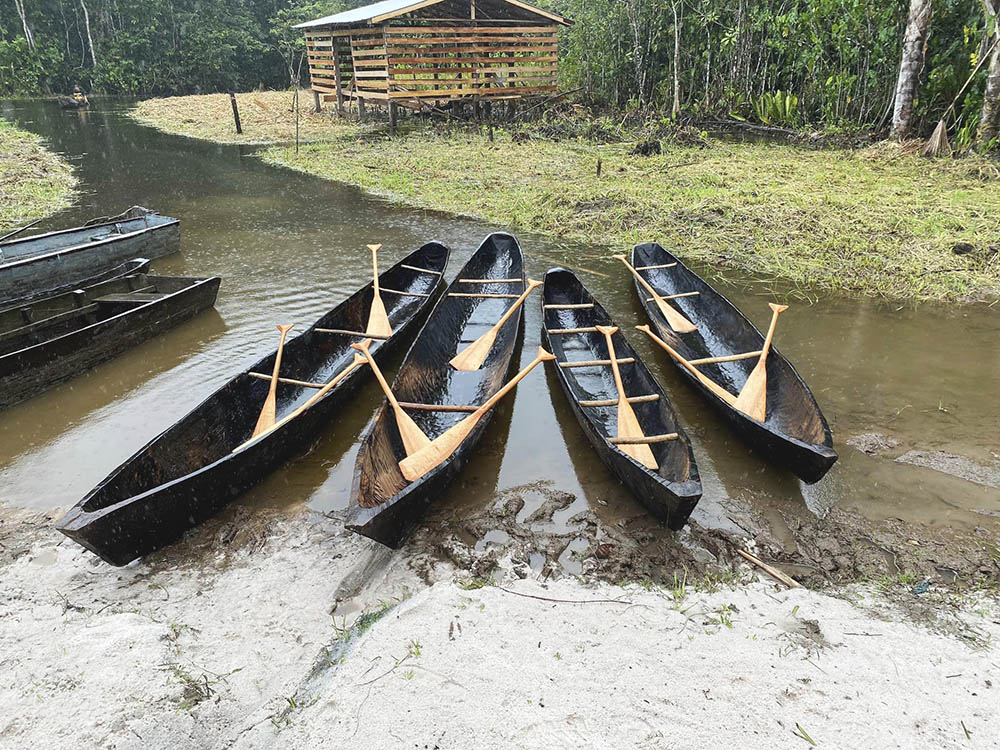A first-time tourism offering for the villages of Santa Rosa and Cabora in Region One, which was funded through the Solidarity Fund for Innovative Projects (SFIP), was on Monday commissioned by the French Government and the Amerindian Peoples Association (APA).
Out of the $15.8 million fund which was allotted to the APA by the French Government, a total of $7,121,940 was spent to establish the two tourism offerings which consist of 16 pedal cycles and safety accessories, seven canoes or ‘corials’, and a building to store them.
During the commissioning which was held at the building located behind the Santa Rosa Secondary School, Senior Councillor and Secretary of the Santa Rosa Village Council, Morris Torres, said talks to have a tourism product in the area had been ongoing since 2017. The council had met with the villagers and explained the process involved with partnering with the APA.

“In 2017, the previous village council… they had consulted with the residents whether they want to be part of this tourism activity and so forth and there was an agreement by residents that yes, we would like to go into that direction… A tourism committee was set up…with that being set up the APA and the village council they partnered and explore a lot of options on how we could start the village on tourism… last year they started some training with some members from the village… in livelihood training, that is how to write a proposal and so on and two of the proposals that we previously consulted on and that came up was the canoeing experience and biking experience.”
According to Torres, the two activities were chosen due to the benefits they bring to one’s life.
Meanwhile, Executive Director of the APA, Jean La Rose, said that like every other project, the members of the village had to undergo proposal training in order to become aware of what their product entails and how they can further promote it for as long as possible.

“The APA came together with a funding proposal that has four components, one being this livelihood activity that the team from the Santa Rosa village put together… the valuable members of the team sat down like children in the classes and had to learn to use manuals, how do you prepare a proposal, why do you prepare a proposal, what is the importance of a proposal, how do you go about it, how long is this project going to last, how much money do you need, who are the people involved, what is it exactly that you want to do”, she related.
Now that a basis for tourism has been formed within the village, La Rose encouraged the members and schoolchildren who were all gathered there to get involved in the tourism product and find other ways in which they can further promote the activity. She challenged them to take up the mantle and paint the newly-built canoes and their paddles. Now that the community is promoting eco-tourism, she urged them to keep their environment clean which is a sore issue that the leaders have been dealing with.
She further exhorted them to take up training which will be essential in the tourism sector, specifically their tourism product and to partner with other communities such as Warapoka, to learn from the trained birders on how to identify some of the species present in Santa Rosa so that they can easily identify them to tourists when biking around the village.
“I am hoping that we discuss this, that people can be trained in first aid for the both the canoeing and the biking trail experience… these things are very, very important, you’re taking people on a bike ride and so what do they know about birding… how can we do neighbourly things and improve on our own facilities that we have… we have great potentials here in the community, you just have to see it and if you don’t see it, sit down have conversations with people who are going through it and who have been through it and you can learn from them and understand how more you can improve your products,” stressed the director.
Foreign languages
French Honorary Consul, Jean-Francois Gerin, in his remarks, urged the people of Santa Rosa to learn a few foreign languages in order to properly sell their products to international tourists who speak differently, but at the same time also encouraged them to teach the tourists their native languages so that as hosts, they will always have their culture alive.
“If you want to sell the product to some French people it means you need to learn French, if you want to sell it to Spanish people you need to learn Spanish… you buy in your language but you need to sell in your customer’s language… It’s not only an opportunity for tourism but it’s an opportunity for exchange… your biggest asset here is your culture… do not lose that culture, do not lose that language because it’s very important, keep your language alive… it is something very, very important. This is something that could actually be an asset for business, an asset for tourism, when you have tourists come here, teach them a few words… use as much as you can get from the internet to learn about your future customers, to know what they look for… the people who pay for these types of product you’re offering are inclined to eco-tourism, and one thing they don’t like is waste… so eco-tourism and your environment, this is what you have, take care of it.”
Santa Rosa’s Toshao, Stavros Stanley, also encouraged his village to take advantage of the tourism sector since there are many opportunities in their village. “Tourism could create a lot of benefits to Santa Rosa, we have rare birds and so on that will attract tourists but we need to adapt and learn how to deal with tourism. There are opportunities there for hotel owners, the business sector, women’s groups and the young people could be trained as guides and workers in the tourism sector… we also would like to encourage partnership development… now this is in its budding stage and I wish to encourage young people to start looking at this sector as an opportunity for you.”
One of the volunteers who was working along with the APA and his village to initiate the tourism products from the start, Marcus Atkinson, said that his main challenge was working with a community that initially had no sort of vision in the tourism field but eventually developed one as the years went by.
“For me, returning to Santa Rosa and working with Santa Rosa as regards to tourism, it was very very challenging… I had to understand the whole concept of tourism from scratch. One of the major challenges was COVID-19. I returned here in 2019 and the village council at that time, they tasked me with assisting in developing tourism in Santa Rosa and we worked, we planned, we strategized, but then COVID-19 hit and it was just down from there. It was very very tough volunteering, trying to make something out of nothing… one of the key components we focussed on that was missing in Santa Rosa as regards to tourism was something that people could do when they come to Santa Rosa and that’s where we developed the canoeing and biking experience.”
Atkinson also encouraged his fellow villagers to not lose their culture but instead promote it through tourism. “We lost a lot of our culture as well and the canoeing, the cycling, going around seeing the villages, seeing how people go about their everyday life, I think it would be a good eye opener for us to not just focus on what we could engage in regards to colonialism, but what we lost as well because from going and engage with the other areas as well, the outlying areas, the amount of kindness, the amount of appreciation, we don’t get that here, you have to pay, but now we have our own initiative and for me it’s not just something that yes we have tourism, but for us regarding our cultural identity as well because people have lost it… when it comes to tourism in Santa Rosa we have a lot to do…”
After the commissioning at Santa Rosa, persons were given the opportunity to ride to Cabora which is approximately 20 minutes from Santa Rosa Secondary School where they were greeted with a canoe ride in the Cabora creek by residents of the two indigenous communities who grew up paddling the canoes to and from their location and also individuals who are trained in the field.
Although there was much positive feedback from the French representatives who took the opportunity to ride on the bikes and in the canoes, the APA Executive Director noted that if the government collaborates with the communities, then tourists can have better roads to ride on. Further work to enhance the environment of the creek will be carried out by the APA.




